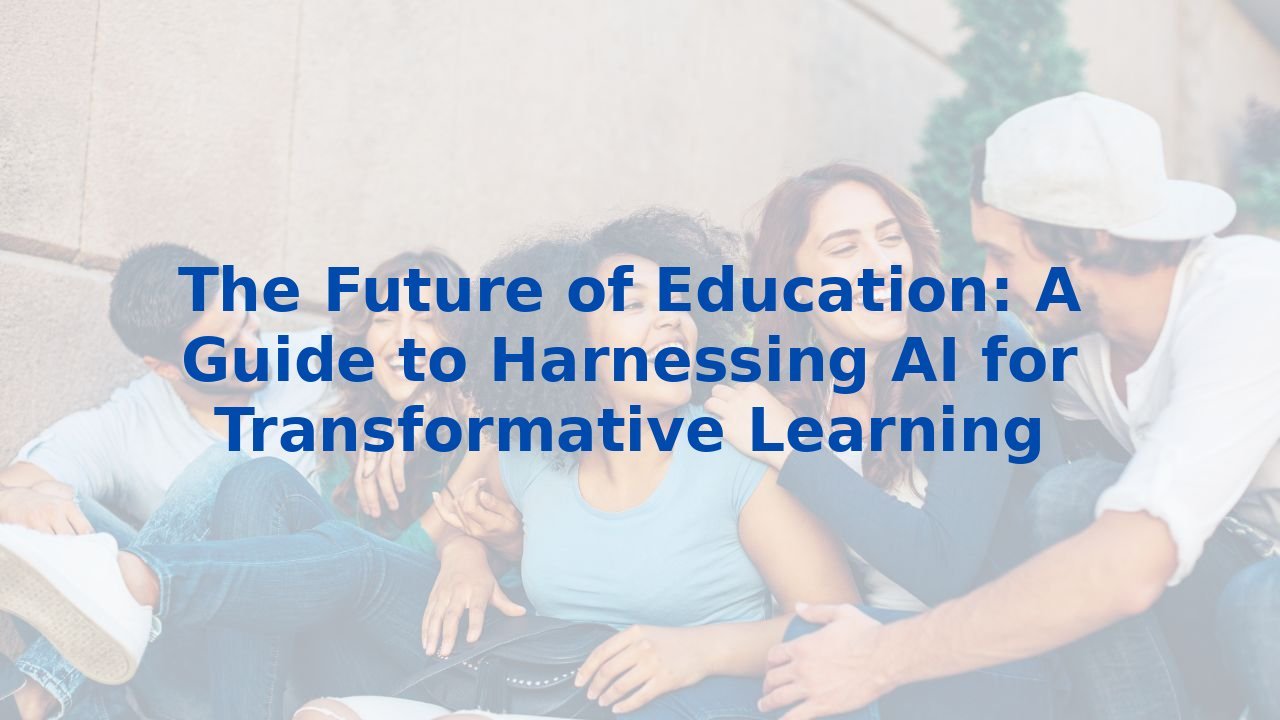The Future of Education: A Guide to Harnessing AI for Transformative Learning
The Future of Education: A Guide to Harnessing AI for Transformative Learning
Introduction
The landscape of education is undergoing an exhilarating transformation driven by the rise of Artificial Intelligence (AI). This integration isn't just a trend—it's an evolution that rewrites the very frameworks around teaching and learning. As we navigate these changes, it becomes imperative to explore how AI can be harnessed for transformative learning experiences across educational contexts.
Enhancing Learning Processes
Personalized Learning
Imagine an educational experience uniquely tailored to each student's strengths and weaknesses. AI makes this a reality by analyzing performance data and learning styles. Through personalized learning plans, students receive targeted support, making complex concepts not just accessible but comprehensible. This shift from a one-size-fits-all approach to personalized trajectories enables educators to unlock each student’s potential.
Adaptive Assessments
Standardized tests are often inadequate in truly assessing a student's capabilities. Enter AI-driven adaptive assessments that intelligently modify difficulty based on real-time performance. This not only offers an accurate measure of student knowledge but also provides insights into areas ripe for growth. Such an approach fosters a supportive learning environment where challenges are met with readiness, rather than frustration.
Virtual Learning Environments
The global shift to online education has been accelerated by necessity, but AI is enhancing this transition. With AI-powered virtual classrooms, students can engage in vibrant interactions that closely mimic traditional classroom settings, no matter where they are located. This technology not only enriches the learning experience but extends educational opportunities to underserved regions—democratizing learning in a previously unimaginable way.
Enhancing Teaching Processes
Automated Grading
For educators, grading assignments can be one of the most daunting tasks, consuming precious time that could be spent on meaningful engagement with students. AI offers a solution with automated grading systems that relieve this burden, allowing teachers to focus on mentorship and feedback. Furthermore, these systems mitigate potential biases, resulting in a fairer evaluation process.
Content Creation
Educators are often expected to produce a wide array of teaching materials, a task that can be overwhelming. Fortunately, AI assists in generating lesson plans, quizzes, and interactive content. In doing so, it saves time while ensuring that materials remain fresh and relevant. Innovative multimedia resources crafted through AI not only heighten student engagement but also provide varied pathways to understanding.
Benefits of AI in Education
Improved Efficiency
When AI enters the educational realm, efficiency skyrockets. By automating routine responsibilities such as grading and content development, educators are empowered to devote their energies to more creative and strategic endeavors. This transformation not only cultivates better student outcomes but also establishes a productive learning atmosphere.
Enhanced Student Engagement
AI tools hold the power to make learning an engaging experience. By leveraging technologies such as virtual reality and augmented reality, educators have the opportunity to create immersive educational experiences that spark curiosity. When students are emotionally invested in what they are learning, motivation flourishes—leading to lasting engagement.
Better Data Analysis
AI excels in analyzing vast data sets related to student performance. This capability produces critical insights that enable educators to make informed decisions. Data trends can reveal the narratives behind student achievement, providing pathways for tailored interventions to support those who may be struggling. The power of informed decision-making amplifies educator effectiveness.
The Importance of AI Training for Employees
Despite the incredible potential that AI holds, its effectiveness hinges on the proficiency of those who wield it. Therefore, comprehensive training for educators on AI tools is not just beneficial; it's essential. Training ensures that educators understand AI's capabilities and limitations, allowing them to harness technology meaningfully in their teaching practices.
Moreover, with the rapid evolution of AI, ongoing education is vital. Equipped with robust knowledge, educators can critically evaluate AI-generated content, safeguarding the accuracy and reliability that students deserve.
Conclusion
The future of education is a thrilling frontier shaped by AI’s transformative influence. By enhancing personalized learning, adaptive assessments, virtual environments, automated grading, content creation, and data analysis, AI is rewriting the script for educational processes.
As we embrace these innovations, let's prioritize training for educators, empowering them to leverage AI's full potential. Together, we can cultivate an educational ecosystem where every learner thrives in an enriching, personalized experience—an experience that will shape not only careers but the very fabric of society.



